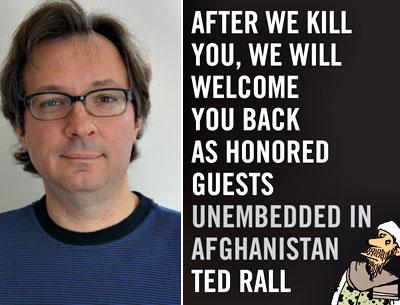Combat Cartoonist

“After We Kill You, We Will Welcome You Back as Honored Guests”
Ted Rall
Hill and Wang, $26
“After We Kill You, We Will Welcome You Back as Honored Guests: Unembedded in Afghanistan” by Ted Rall is the biggest small book I’ve come across in some time. It is at turns audacious, confounding, mesmerizing, infuriating, and disorienting.
This latter sense of being on shaky ground does not stem from its author’s courageous journalism, writing style, or cartoons (more on them later). Nor does it come from the boilerplate history of our war — our longest — in Afghanistan, whose disturbing antecedents the author lays out as clearly as can be expected given the bloody tangle of alliances, faux alliances, misread histories, misrepresentations, and corrupt petro politics — in short, the grand illusion we have come to accept, if not believe.
No, the sense of being at sixes and sevens is the author’s own, hard-won during extremely dangerous, self-imposed assignments, and passed on to the reader intentionally because at the heart of his two visits to Afghanistan, one at the start of the war immediately following the 9/11 attacks, the other about 10 years later, lies this question:
How did a mostly illiterate, constantly warring, multitribal society living, in Mr. Rall’s opinion, a 14th-century lifestyle come to control the foreign policy of the world’s most powerful nation at the cost of billions of dollars and thousands of lives?
Mr. Rall takes a crack at it. He tells how our involvement had virtually nothing to do with the Taliban having orchestrated the 9/11 attacks, because they didn’t. It had nothing to do with Osama bin Laden hiding in Afghanistan, because — as history has shown — he probably wasn’t. And, he tells about the pre-9/11 efforts among the highest ranking officials, U.S. oil companies, and the Taliban to construct a pipeline to bring oil from Kazakhstan across Afghanistan to a deep-water port in Pakistan.
He explains how our confusion has a lot to do with the fact that billions in U.S. aid to Pakistan have gone to the Taliban, the group the U.S. military is fighting, via Pakistan’s intelligence agency.
We find ourselves in 14th-century darkness with a trail of receding lights so convoluted it’s nearly impossible to tell how we got here, except for one, blazing, all-but-ignored truth that the author returns to again and again: “Since the beginning of the twentieth century, no nation-state has successfully invaded another — i.e., settled into an unopposed occupation or one that did not continue until the invading nation was forced to withdraw.”
You will have noticed that since the author’s last visit in 2010, the U.S. has “withdrawn” from Afghanistan, but given the extreme fundamentalism of ISIS in Iraq and Syria, we see how the miscalculations, questionable goals, and a misreading of history, and especially of people, are alive and well.
This history is not popular, but neither is it unknown, of course. The revelations found in “After We Kill You” are the kind that only a grunt reporter finds, the kind of fearless (or insane) freelancer who refuses the relative comfort and protection that come with being embedded with the military.
I confess there were times when I wondered, especially in light of recent kidnappings and beheadings, whether Ted Rall might have been more than delusional regarding his safety and that of his fellow cartooning journalists. Cartooning journalists?
I loved this part. On one hand, you have the reporters of big news organizations, some of them top-notch and yet burdened by assets including gobs of cash to grease the palms of handlers, translators, and drivers. Mr. Rall cobbled together the funds for his perilous ventures from an L.A. radio station for which he did a political talk show, and from The Village Voice, for which he drew cartoons and wrote feature stories.
His wacky idea was to convey what was happening in country via text and cartoons, which he did using equipment with dying batteries, intermittent satellite phone connections, and, as he needed to inform a transcriber at The Voice, without a Staples in sight. Mr. Rall’s cartoons are included in this book, and they work successfully as a kind of crib to clarify and enlarge upon his insights.
The road less traveled put him, along with his wife and his agent on the first trip, and with two cartooning colleagues on the second, in dangerous (and a few blackly humorous) situations, but it also put him with the people. These were not the people found in Kabul or Kandahar, but the folks living in poverty, fear, and a dogged (stubborn) determination to live by rules that died centuries ago in most parts of the world.
I found refreshing Mr. Rall’s less than romantic view of the Afghan people. He made friends, a few he trusted with his life. You sense a kind of respect, but it’s a wary respect for a people who seemed destined by their ways — a duplicitous trait gives the book its title — to serve as pawns in a game beyond their understanding.
Of course, as Mr. Rall points out, we don’t understand it either, but neither are we forced to live it, except for the televised pain of lost lives and treasure. It’s a pain once removed thanks to our diet of anemic journalism. “After We Kill You” is anything but.
This little book of brave reporting, excellent writing, and informative panels of well-drawn cartoons lets the reader taste the dust, feel the cold, and smell the banality of violence. A great read.
Ted Rall’s previous books include “The Book of Obama” and “The Anti-American Manifesto.” He lives in East Hampton.
